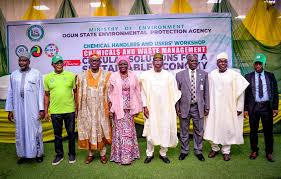The Ogun State Commissioner for Environment, Ola Oresanya, has raised alarm over Nigeria’s growing waste problem, saying the country generates more than 32 million tonnes of waste every year. He warned that the poor handling of this waste is creating serious health and environmental issues across the country.
Oresanya made this known at the 2025 World Environment Day and Exhibition organised by Green Hub Africa. The event, which was themed “From Pollution to Innovation: Aligning Policy, Enterprise and Community for Sustainable Waste Management in Nigeria,” brought together environmental experts, government officials, and private sector players to discuss solutions.
According to the commissioner, only about 40 per cent of the waste generated in Nigeria is collected, leaving the rest to pollute the environment. He said the result is polluted air, dirty water, soil degradation, and a rise in greenhouse gas emissions. He also pointed out the danger of plastic pollution, especially in coastal areas where waste is dumped into rivers and oceans.
“There are too many illegal dump sites in Nigeria, and our recycling system is very weak,” Oresanya said. “We don’t have enough infrastructure to move and process waste efficiently. We also lack the homegrown technology to support proper collection and recycling.”
He further explained that the country has a National Policy on Solid Waste, which covers how waste should be generated, collected, and disposed of. However, he noted that this policy is not well implemented because enforcement is weak and coordination between different levels of government is poor. Local governments, which should play a key role, are struggling due to lack of funding.
“There is also a big problem with public awareness,” he added. “Many Nigerians still don’t understand the importance of managing waste properly. People still dump refuse carelessly and do not separate waste for recycling.”
Oresanya recommended that Nigeria should introduce something similar to the European Union’s Extended Producer Responsibility (EPR) scheme. This would mean companies that produce goods also take responsibility for the waste that comes from their products, especially plastic waste. He also suggested giving tax incentives to companies that follow sustainable practices and punishing those who don’t comply.
He encouraged government agencies to run stronger public campaigns that speak directly to people using easy-to-understand methods. These campaigns, he said, should be built around the Expansion Diffusion Theory, which helps explain how information spreads in a society. He added that Nigeria’s efforts must align with the United Nations’ Sustainable Development Goal 12, which promotes responsible consumption and production.
Also speaking at the event, the Chairman of Green Hub Africa, Professor Obas Ebohon, said the world is facing environmental pressure like never before. He noted that signs of climate change and environmental stress are visible in the form of rising temperatures and unusual weather patterns.
“Globally, we are producing over 300 million tonnes of plastic waste every year, and only nine per cent of that is being recycled,” he said. “Here in Africa, we generate about 17 million tonnes of plastic waste annually, but we are only able to recycle less than four per cent. That is a very serious problem.”
Professor Ebohon said Nigeria, with its population of over 220 million, can lead the way in solving Africa’s environmental problems. He stressed that Nigeria’s waste and pollution problems are not isolated issues. What happens in Lagos, Kano, or Ogun State, he said, reflects similar challenges across the world.
He praised the idea of bringing government policy, private innovation, and community efforts together to solve the problem. “The answer won’t come from government alone. It won’t come from the private sector alone. We need everyone—government, businesses, and ordinary people—to work together. That is the only way we can solve these problems.”
He said the challenges Nigeria faces today are also opportunities to innovate, and that solving them can bring global recognition and long-term development.
